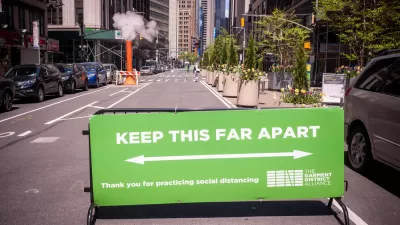The membership of decisionmaking bodies such as planning commissions rarely reflects the socioeconomic, gender, and racial characteristics of the local community.

Who is represented in planning decisions? “Land-use laws influence home prices, class and racial segregation, carbon emissions levels, and labor market efficiency,” making this a key question, write Lydia Lo, Eleanor Noble, Yonah Freemark in a new study for the Urban Institute.
The study analyzed “the racial and gender characteristics, housing tenures, and occupations of land-use decisionmaking board members across 482 jurisdictions and 601 land-use decisionmaking bodies within the 50 largest metropolitan areas in the United States.”
The study found that, by and large, “the people who draft, adjudicate, and implement land-use laws rarely share similar demographics, occupations, or housing tenures as their jurisdiction’s residents.”
The article details the data on representation, noting that “Forty-five percent of land-use boards have a membership that is at least 95 percent white, even though only 5 percent of jurisdictions have such high white population shares.” Additionally, men are overrepresented by more than 20 percentage points, while renters are underrepresented in 99 percent of jurisdictions. Planning and zoning board members also tend to come from planning- or real estate-related professions. “Meanwhile, there are few board members hailing from the food, health care, and retail sectors, and retirees, homemakers, and unemployed people are similarly underrepresented.”
According to the authors, these differences matter because “These results may offer one explanation for why US cities have suffered from decades of inadequate housing construction, low levels of housing affordability, and high levels of segregation.” The authors note that boards that offer supports like child care, compensation, or flexible meeting times are more likely to more accurately represent the local community, and recommend state-level requirements for such accommodations to encourage more representative membership in land use decisionmaking bodies.
FULL STORY: Who Makes Planning Choices?

Alabama: Trump Terminates Settlements for Black Communities Harmed By Raw Sewage
Trump deemed the landmark civil rights agreement “illegal DEI and environmental justice policy.”

Planetizen Federal Action Tracker
A weekly monitor of how Trump’s orders and actions are impacting planners and planning in America.

The 120 Year Old Tiny Home Villages That Sheltered San Francisco’s Earthquake Refugees
More than a century ago, San Francisco mobilized to house thousands of residents displaced by the 1906 earthquake. Could their strategy offer a model for the present?

San Francisco Opens Park on Former Great Highway
The Sunset Dunes park’s grand opening attracted both fans and detractors.

Oregon Legislature to Consider Transit Funding Laws
One proposal would increase the state’s payroll tax by .08% to fund transit agencies and expand service.

Housing Vouchers as a Key Piece of Houston’s Housing Strategy
The Houston Housing Authority supports 19,000 households through the housing voucher program.
Urban Design for Planners 1: Software Tools
This six-course series explores essential urban design concepts using open source software and equips planners with the tools they need to participate fully in the urban design process.
Planning for Universal Design
Learn the tools for implementing Universal Design in planning regulations.
Clanton & Associates, Inc.
Jessamine County Fiscal Court
Institute for Housing and Urban Development Studies (IHS)
City of Grandview
Harvard GSD Executive Education
Toledo-Lucas County Plan Commissions
Salt Lake City
NYU Wagner Graduate School of Public Service





























